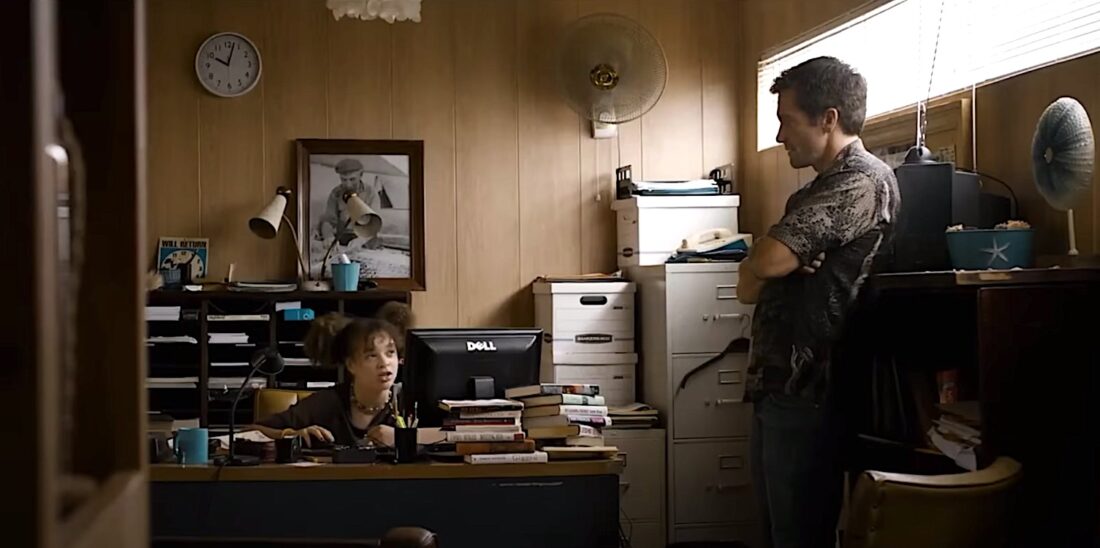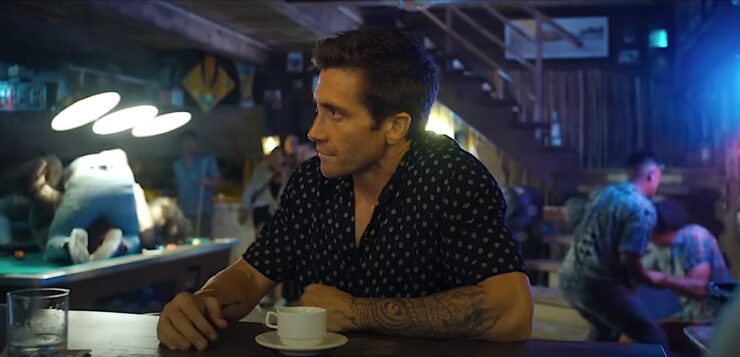Predictably, I love the original Road House—who wouldn’t love a movie about a bouncer/philosophy student who does lakeside Tai Chi and can rip a man’s throat out with his bare hands? I went into Doug Liman’s Road House reboot with some trepidation, but I realized there are a few ways that the new film bests the original. First of all, its set in Florida, on the fictional Glass Key. The very real Fred the Tree is featured, there’s a scene where an American Crocodile eats a dude, and in this one Dalton lives on a scruffy houseboat instead of in a ridiculously chic lofted barn. But the biggest difference, improbably, concerns an independent bookstore.
I came to the original Road House like a lot of people of my disposition: endless jokes about the film on MST3K. It was the inspiration for the holiday standard “Let’s Have a Patrick Swayze Christmas” and a good thing to know about me is that every single time I hear Crow T. Robot sing “I’ll have to smash your kneecaps if you bastards touch my car” I’m reduced to helpless crying laughter. (I’m finding it hard to type this sentence for that very reason!)
In the world of the Road House reboot, pain still don’t hurt, and it is the indie bookstore that is the Regular Saturday Night Thing.
For those who don’t know the original: Patrick Swayze is great. Genuinely great, no snark here, I’m pretty much always sad that he’s gone. He’s great in Road House. He’s great in the pro-abortion feminist classic Dirty Dancing. He’s great in Ghost. And he’s extra great in Donnie Darko, where he became a bit of a hero to young Jake Gyllenhaal—who now, years later, has reinvented one of Swayze’s classic roles.
The bullet points of the original Road House have been covered before: he’s a (famous!) bouncer, who travels from town to town cleaning up bars, like if Shane was an AA sponsor. He also did time at NYU studying philosophy, which he defines as “Man’s search for faith, that kind of shit.” That’s not even remotely accurate as a definition of the study of philosophy. Even in movie terms, Indiana Jones got closer with “Archaeology is the search for FACT not truth. If it’s truth you’re interested in, Dr. Tyree’s philosophy class is right down the hall. [undergraduate laughter].” It’s closer to say that philosophy is the study of the nature of knowledge and reality—more man’s search for fundamental meaning, for core reality, for some sort of transcendent truth that underlies individual beliefs—i.e., all the stuff faith kind of handwaves away.
Dalton didn’t have any particular concentration during his studies. Presumably then, he was an undergrad and never when on to graduate work. We also know that in the 1970s, he and Wade were cleaning up a bar in Alabama. But since Dalton is working in New York at the start of the film, and his bitchin’ Mercedes has a New York license plate, I’m choosing to posit that he attended NYU in the early to mid ‘80s, shortly before the events of Road House, as a sabbatical from his strenuous work as a cooler.
If I’m right, he might have studied with James Burnham, and used that professor’s conservative text, The Managerial Revolution, as a key in understanding how evil small town real estate king Brad Wesley supervised a group of henchmen, Monster Truck drivers, and his stripper girlfriend to solidify his control over Jasper, Missouri. Or is it possible that Dalton was influenced by Ferdinand Lundberg and his work on exposing American oligarchy—America’s 60 Families and The Rich and the Super-Rich—in his attempt to route Wesley from his iron grip on the town? And of course, most significant would be his study of the work of Thomas Nagel, with papers like “What is it Like to be a Bat?”, and the deep consideration of the mind-body problem—because what is Road House if not a film-length meditation on the mind-body problem? And what is “consciousness is what makes the mind-body problem really intractable” but a more academic way of asking “pain don’t hurt”?
Why have I taken us down this philosophical tangent? The fact that Dalton has a philosophy degree is one of the things that makes the original film so special. It’s an interesting, unexpected detail that gives some depth to a character that might have been another 1980s action meathead. I was worried that the reboot would ditch that kind of quirkiness, but instead, it found its own way to add layers.
More than in the original Road House, the reboot tells a larger story of predation. There are people who want to go to the Road House and have a nice night out, people who want to rent paddleboards and have fun in a light surf, people who love the relaxed rhythms and overwhelming nature of Florida. But always there are the others, the guys who get drunk and belligerent and threaten the band, the girls who get too drunk and dance on a table, the jet skiers who swamp the boarders in waves and exhaust, and the real estate developers who want to raze the state’s natural beauty to build resorts for the rich.
As this is an action movie, it has to end in a big explosive blowout fight to the death. In the original, it’s set in motion after the villain burns down an auto repair shop, threatens Dalton’s girl (in a super gross ‘80s “If I can’t have her, no one can” way), and, finally, murders Dalton’s mentor in bouncing, Wade Garrett.
Yeah. The Wade Garrett.
There are explosions and queer-coded henchmen and a dude gets squashed by a taxidermied polar bear.
In many ways, Road House is a perfect film.
The new Road House goes in a different direction; here, the carnage isn’t triggered by a girlfriend or a henchman—it’s because of an indie bookstore.

Glass Books (motto: Get hooked on books!”) isn’t just a bookstore. It’s the gateway to Glass Key, the first thing you see when you get off the Greyhound. When Dalton comes to town, blood still seeping from a recent knife wound, fresh off a suicide attempt, he’s greeted by Charlie, the teen who runs Glass Books with her dad Stephen. She gives Dalton a book about Fred the Tree, a real icon of the Florida Keys. It’s a little indie-pubbed chapbook that Dalton spends the rest of the film reading between skirmishes. Later, he uses the store’s computer to research his villain’s nefarious plot. He lets Charlie open up about her mother, the one who decided Glass Key needed a used bookstore, and about her mother’s death the previous year. (She meets his condolences with: “It happens. Only here it always happens on a beautiful day.”)
In this bright and sunshine-y movie, Glass Books is a dark haven. The walls are covered floor-to-ceiling in bowed, overstuffed shelves, with books about Florida culture prominently displayed by the ancient cash register. Dalton’s visits to the store are his only truly safe moments, and they’re also the site of his very sweet friendship with Charlie. She compares him to a Western hero come to clean up Glass Key and he lets her riff. When she finds a Western pulp paperback, Death at the Double X, starring the “intrepid” Wade Waco, he tells her that he couldn’t tell her whether he’s “intrepid” like the hero or not, but he’s clearly amused, not irritated. There’s no point where he seems annoyed or condescending—he accepts her friendship.
In the original Road House, Dalton went to the auto parts store a lot because bastards kept touching his car. (RIP to various kneecaps.) He had a cordial relationship with the store’s owner, Red, who also turned out to be his love interest’s uncle. But Dalton and Red weren’t really close, and the auto parts store was just one in a series of places that the nefarious Ben Wesley fucked with, to prove that he ruled Jasper, Missouri. A thing he wanted to do for some reason.
In the new Road House, Glass Books has an actual backstory and personality. Charlie obviously sees it as her mom’s legacy. It’s not just a store, and it’s not even a source of reliable income—Charlie’s dad works another job to keep them both afloat. But the store is their connection to their lost wife and mother. We never see their home, because I suspect the bookstore is their real home.
Obviously, the villains clock Dalton’s friendship with Charlie. Instead of Red’s auto shop, it’s the bookstore that burns in the new Road House. Charlie tries to defend the store with her trusty baseball bat, but she and her dad end up in the hospital. (This happens offscreen, presumably to keep the film fun.) Dalton is already on his way out of town when he sees the burned out shell of Glass Books. He pushes past firefighters to stand in the ruin. The rest of the film is one bloody fight after the next, punctuated by the occasional explosion, as he works his way through evil real estate developer Ben Brandt and all of his dickhead henchmen. (Sidenote: between this and the goddamn instant classic Monkey Man, complicated action heroes have learned how to stab properly again, and it fills me with joy?)
The bookstore is the heart of Glass Key: rather than a damsel, or an older mentor figure, or the Concept of Small Town America, or even the bar Dalton was literally hired to protect, the bookstore is what is avenged, and ultimately reborn. Where the original Road House gave us a redemptive ending for Dalton, here his ending is bittersweet (and a springboard for a sequel, of course), but Glass Books and its keepers get an unambiguously triumphant ending.
In the world of the Road House reboot, pain still don’t hurt, and it is the indie bookstore that is the Regular Saturday Night Thing.










